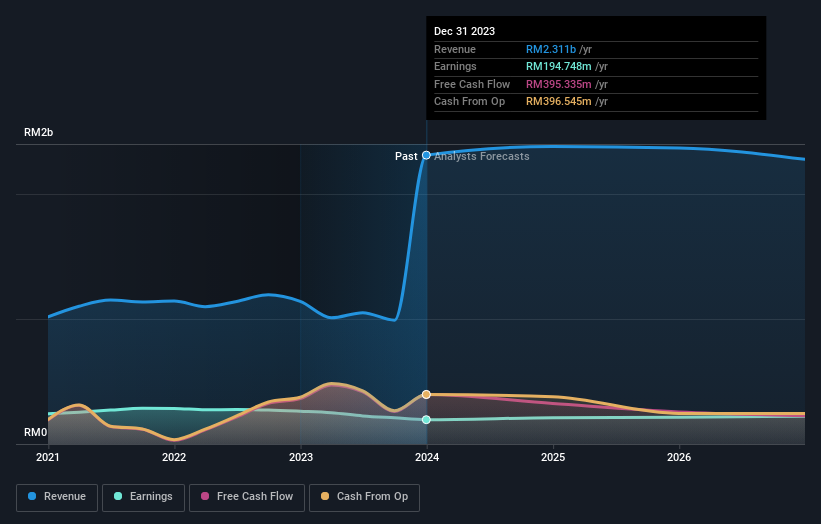While individual investors own 30% of British American Tobacco (Malaysia) Berhad (KLSE:BAT), private companies are its largest shareholders with 52% ownership
Key Insights
The considerable ownership by private companies in British American Tobacco (Malaysia) Berhad indicates that they collectively have a greater say in management and business strategy
British American Tobacco Holdings Malaysia B V owns 50% of the company
11% of British American Tobacco (Malaysia) Berhad is held by insiders
A look at the shareholders of British American Tobacco (Malaysia) Berhad (KLSE:BAT) can tell us which group is most powerful. The group holding the most number of shares in the company, around 52% to be precise, is private companies. Put another way, the group faces the maximum upside potential (or downside risk).
And individual investors on the other hand have a 30% ownership in the company.
Let's take a closer look to see what the different types of shareholders can tell us about British American Tobacco (Malaysia) Berhad.
View our latest analysis for British American Tobacco (Malaysia) Berhad
What Does The Institutional Ownership Tell Us About British American Tobacco (Malaysia) Berhad?
Institutions typically measure themselves against a benchmark when reporting to their own investors, so they often become more enthusiastic about a stock once it's included in a major index. We would expect most companies to have some institutions on the register, especially if they are growing.
We can see that British American Tobacco (Malaysia) Berhad does have institutional investors; and they hold a good portion of the company's stock. This suggests some credibility amongst professional investors. But we can't rely on that fact alone since institutions make bad investments sometimes, just like everyone does. When multiple institutions own a stock, there's always a risk that they are in a 'crowded trade'. When such a trade goes wrong, multiple parties may compete to sell stock fast. This risk is higher in a company without a history of growth. You can see British American Tobacco (Malaysia) Berhad's historic earnings and revenue below, but keep in mind there's always more to the story.
We note that hedge funds don't have a meaningful investment in British American Tobacco (Malaysia) Berhad. British American Tobacco Holdings Malaysia B V is currently the company's largest shareholder with 50% of shares outstanding. This essentially means that they have extensive influence, if not outright control, over the future of the corporation. For context, the second largest shareholder holds about 3.5% of the shares outstanding, followed by an ownership of 2.1% by the third-largest shareholder.
While it makes sense to study institutional ownership data for a company, it also makes sense to study analyst sentiments to know which way the wind is blowing. There are a reasonable number of analysts covering the stock, so it might be useful to find out their aggregate view on the future.
Insider Ownership Of British American Tobacco (Malaysia) Berhad
The definition of company insiders can be subjective and does vary between jurisdictions. Our data reflects individual insiders, capturing board members at the very least. Company management run the business, but the CEO will answer to the board, even if he or she is a member of it.
Most consider insider ownership a positive because it can indicate the board is well aligned with other shareholders. However, on some occasions too much power is concentrated within this group.
Our most recent data indicates that insiders own a reasonable proportion of British American Tobacco (Malaysia) Berhad. Insiders own RM255m worth of shares in the RM2.3b company. It is great to see insiders so invested in the business. It might be worth checking if those insiders have been buying recently.
General Public Ownership
The general public-- including retail investors -- own 30% stake in the company, and hence can't easily be ignored. While this group can't necessarily call the shots, it can certainly have a real influence on how the company is run.
Private Company Ownership
It seems that Private Companies own 52%, of the British American Tobacco (Malaysia) Berhad stock. It's hard to draw any conclusions from this fact alone, so its worth looking into who owns those private companies. Sometimes insiders or other related parties have an interest in shares in a public company through a separate private company.
Next Steps:
I find it very interesting to look at who exactly owns a company. But to truly gain insight, we need to consider other information, too. For instance, we've identified 3 warning signs for British American Tobacco (Malaysia) Berhad that you should be aware of.
If you are like me, you may want to think about whether this company will grow or shrink. Luckily, you can check this free report showing analyst forecasts for its future.
NB: Figures in this article are calculated using data from the last twelve months, which refer to the 12-month period ending on the last date of the month the financial statement is dated. This may not be consistent with full year annual report figures.
Have feedback on this article? Concerned about the content? Get in touch with us directly. Alternatively, email editorial-team (at) simplywallst.com.
This article by Simply Wall St is general in nature. We provide commentary based on historical data and analyst forecasts only using an unbiased methodology and our articles are not intended to be financial advice. It does not constitute a recommendation to buy or sell any stock, and does not take account of your objectives, or your financial situation. We aim to bring you long-term focused analysis driven by fundamental data. Note that our analysis may not factor in the latest price-sensitive company announcements or qualitative material. Simply Wall St has no position in any stocks mentioned.

 Yahoo Finance
Yahoo Finance 

